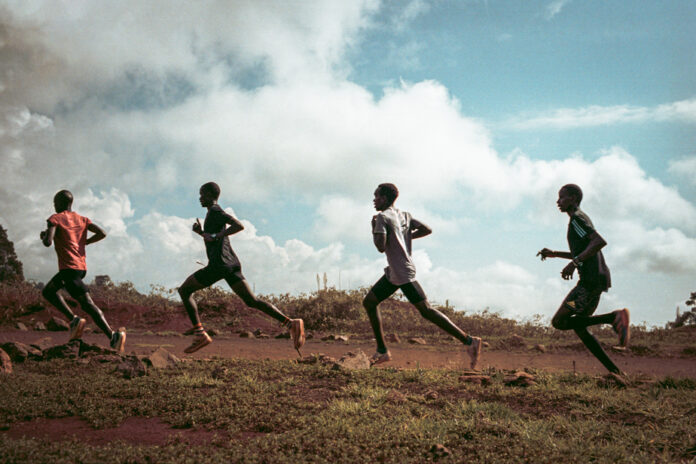“If it’s possible for the neighbor, it can be for me too,” Daniel Wanjiku, 42, told me in a nervous voice before starting his first race at the Kabarnet half marathon.
Kabarnet, a modest municipality separated from Iten by a large valley populated by crocodiles and giant termite mounds, attracts elite runners this Saturday morning. All share the same ambition under the blazing sun: to win the prize of 250,000 shillings reserved for the winner, a substantial sum in a corner of the world where almost half the population lives below the poverty line.
The governor shakes hands while the banners are raised by the eldest of a farming family. A beggar dressed in an oversized suit solicits the generosity of spectators to honor God. Among the crowd of runners, I observe the latest technical shoes as well as Velcro shoes, toques and denim shorts, revealing the diversity of financial means. Here, there are no bib chips or blocked streets. Goats, children and tractor-trailers pose obstacles to a scholarship that can change destiny.
On the starting line, I spotted Sarah whom I had photographed the day before. The one who runs a small hairdressing salon in Iten told me that she had tried her luck on the professional circuit, but her efforts in Amsterdam and Brussels were unsuccessful. She had to face tough competition from her compatriots as well as Ethiopian opponents. His only sponsor had let him down. With her last savings, she opened a salon along the main road. Despite everything, she does not lose hope.
Sarah and Daniel will not be among the first ten to receive a stamp.
At 24, Wallace Kigen is on the final lap of a race against time. He has one year left to obtain an American scholarship.
Son of a runner, he trains with a group of young people sharing the same goal: that of getting a ticket to America. Supervised by two coaches, they participate in filmed sessions each month, which are then sent to American recruiters, in the hope of being accepted into a prestigious or unknown university.
Since joining this group, Wallace, a 5,000-meter specialist, has seen more than twenty of his comrades leave. The last one left the country for the University of Akron on a full scholarship, including airfare.
On the sides of the road crossing Iten, a small town in western Kenya, barefoot children chase moving tires, repeating the cliché of an Africa gripped by poverty. Many Kalendjins are condemned to plowing family land to supply the modest stalls of local markets. Within this environment, athletic scholarships stand like a Klondike in the popular imagination.
Although Iten is considered one of the best places in the world for running, many young Kenyans long to leave their homeland. The vast majority of runners come from modest backgrounds and have never had the opportunity to leave the country. For the latter, the immaculate sports halls of the United States represent a sparkling Eldorado much more attractive than the diploma which comes with it.
At 22, Steven has just clocked an impressive 800 meter time, opening the door to a very promising scholarship. However, so far only one Catholic community college in Iowa has indicated interest. During the interview, he hid a torn hamstring. While waiting for other answers which are desired, he is counting on a meager financial allowance provided by his parents to pay his rent which he shares with three other runners.
What if this opportunity doesn’t materialize? “I will continue to race in Kenya. I want to continue my training and turn professional. I won’t end up as a boda-boda driver,” he says resolutely. For many athletes, training is more than just sports preparation; it is an escape from manual labor and a source of social prestige.















